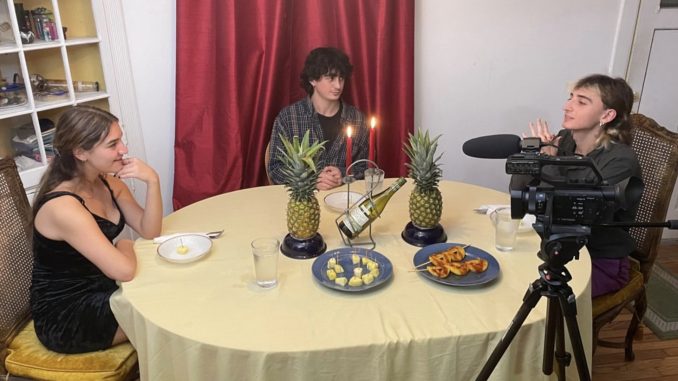
48 hours. Two days and two nights. What fully fleshed out creative work could one even come up with? For the Media Society club, that work is a completed film. As part of FILM 48, from Oct. 20-22, teams of 5-10 people pitched, filmed and edited a three-to-six minute film from scratch. With so much to do in so little time, some may be put off by the time crunch and sheer chaos, but as Sydney Dahl, third-year digital media production major and president of the Media Society club puts it, it’s all just part of the fun.
For participants, the process begins before the guidelines are provided. In order to make the process run smoother, booking locations, finding actors and renting equipment prior to the 48 hour period is essential. Proper planning of these things can ensure that teams can focus on the film-making itself, but that’s the extent of the planning. Once Friday afternoon came around, teams were given guidelines — a genre, a character name, a prop and a line of dialogue — to include in their films as part of the challenge.
Then comes the script — and it doesn’t always have to be completely polished. For example, Dahl’s methodology relies on actor improvisation; though her team has a general idea of a scene, it is up to the actors to best articulate the scene’s mood and current dynamics through their dialogue and actions. She also explained that oftentimes, the improvisation would change the course of the film’s plot and change it into something different than what they set it out to be. Though there is less control over the film’s content, this method introduces new content that would be “10 times better than anything [they] could’ve written for [the actors],” as Dahl put it.
When it comes to the production stage, every factor is crucial, but what Dahl highlighted as an especially important factor to her was “having the right equipment.” Lighting, audio and camera quality can add value and enhance the audience’s experience, which is why having the right equipment can make a film rather than break it. This is especially important for filming at night, which may be unavoidable depending on how the teams time it. Equipment can be rented through Hawk Studios or the Digital Media Journalism office if teams don’t personally own professional equipment. Once all the filming is completed, the rest of the period is spent in post-production, stitching together a coherent, completed film. Though tedious and long, a film really comes to fruition here. The final film must be submitted that Sunday at noon, marking the end of the 48 hour period.
Though the process may sound overwhelming, Dahl highlighted a few benefits to participating. First and foremost, “it is a serious bonding experience with your team.” Being in a collaborative environment for an extended period, participants learn to work together and help one another, fostering strong relationships through a common goal to work towards. Another benefit that Dahl mentioned, especially with the challenge being run by New Paltz’s Media Society club, is that “you can put as much into it as you want.” A team can use every precious minute in their 48 hour period or they can utilize less than 12 hours; it’s up to their discretion and further alleviates the pressure on the teams in their production. At the end of the day, this competition is driven by passionate filmmakers and those willing to have fun. The effort they put in is entirely up to them, so long as there is a finished product by the end. Speaking of that finished product, the biggest pro to competing is the film itself. Having a film to watch in the end during the club’s viewing party and being able to take ownership is an incredibly satisfying reward.
The cons are mostly situated in the time frame itself — having only 48 hours to create an entire film can be intense, stress-inducing and pressuring for anyone. But by doing the necessary pre-production work and collaborating with the rest of the team, the challenge isn’t as demanding as one may anticipate, especially if participants allow themselves to enjoy the process and the challenge for what it is: film enthusiasts coming together to create something incredible.
To those who are hesitant about joining, Dahl says, “pull the trigger and do it.” There are plenty of opportunities for those looking to participate but don’t have a team of their own. Established teams always need an extra hand, and that could serve as a gateway to new friendships too. It isn’t a requirement to be a film or digital media major either. All that FILM 48 asks is that participants undergo the challenge with the readiness and excitement to create a film they are proud of. Even if a team creates a film entirely on their phone, as long as they’re having fun and making something they like, the audience will see that too.
FILM 48 is the main event that the Media Society club runs, but they are also considering expanding their current workshops on various film components. One example is a previous workshop that focused on green screens. Catering to its members’ needs, the club seeks to educate and build its members’ understanding of film techniques, the filming process and other club interests that arise. They are always open to new members, with their next FILM 48 event happening in March of 2024.
For future updates and events, check out their Instagram page @npmediasociety.
